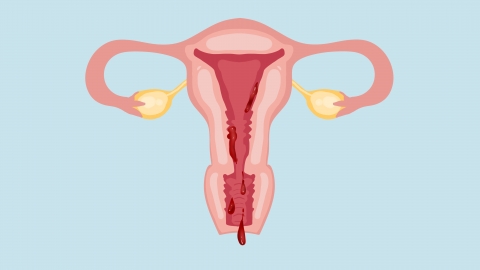What are the causes of functional uterine bleeding?
Generally, dysfunctional uterine bleeding may be caused by factors such as hormonal instability during puberty, hormonal fluctuations during perimenopause, polycystic ovary syndrome, hyperprolactinemia, and hypothyroidism. It is recommended to seek timely medical attention, identify the underlying cause, and undergo symptomatic treatment under a doctor's guidance. A detailed explanation is as follows:

1. Hormonal instability during puberty: During puberty, the hypothalamic-pituitary-ovarian axis has not fully matured, leading to uncoordinated secretion of estrogen and progesterone. This causes irregular shedding of the endometrium and subsequent bleeding, manifesting as irregular menstrual cycles and variable menstrual flow. No excessive intervention is necessary, as this condition can gradually improve with age. It is important to maintain regular sleep patterns, avoid staying up late, and, if bleeding is heavy, follow medical advice to use estrogen-progesterone medications such as estradiol valerate tablets, progesterone soft capsules, or conjugated estrogens to regulate hormone levels and reduce bleeding.
2. Hormonal fluctuations during perimenopause: During perimenopause, ovarian function declines, and estrogen secretion decreases and fluctuates greatly. The endometrium loses its regular shedding pattern, resulting in abnormal bleeding, accompanied by hot flashes and insomnia. It is important to maintain emotional stability and avoid anxiety. Follow medical advice to use hormone-regulating medications such as dydrogesterone tablets, nylestriol tablets, or medroxyprogesterone acetate tablets. During bleeding, rest adequately, enhance nutrition, and prevent anemia.
3. Polycystic ovary syndrome: Ovarian dysfunction leads to elevated androgen levels and ovulation disorders. The endometrium is continuously stimulated by unopposed estrogen, causing excessive proliferation and breakthrough bleeding, accompanied by hirsutism, acne, and oligomenorrhea. Patients should control body weight and follow a low-calorie diet. Follow medical advice to use medications such as ethinylestradiol-cyproterone acetate tablets, spironolactone tablets, or drospirenone-ethinylestradiol tablets to reduce androgen levels while promoting endometrial shedding and restoring regular bleeding.
4. Hyperprolactinemia: Excessive prolactin secretion by the pituitary gland inhibits ovarian ovulation, leading to insufficient estrogen secretion. This causes endometrial thinning or irregular shedding and subsequent bleeding, accompanied by galactorrhea, and oligomenorrhea. Patients should avoid staying up late and mental stress. Follow medical advice to use medications such as bromocriptine mesylate tablets, vitamin B6 tablets, or cabergoline tablets to reduce prolactin levels. Patients with pituitary microadenomas require long-term medication, and ovulation and menstruation can gradually normalize after prolactin levels return to normal.
5. Hypothyroidism: Insufficient secretion of thyroid hormones affects ovarian function and hormonal balance, leading to abnormal endometrial shedding and bleeding, accompanied by cold intolerance, fatigue, and weight gain. Patients may follow medical advice to use medications such as levothyroxine sodium tablets, thyroid tablets, or Yikang capsules to supplement thyroid hormones. Once thyroid function returns to normal, symptoms of uterine bleeding can improve.
Maintain healthy lifestyle habits in daily life, avoid excessive fatigue and mental stress, eat a balanced diet, and engage in appropriate physical exercise to enhance physical fitness. During bleeding, maintain external genital hygiene, change sanitary products frequently, avoid tub baths and sexual intercourse to prevent infection. Regularly record menstrual cycles and bleeding volume to assist doctors in evaluating the condition and adjusting treatment plans.





